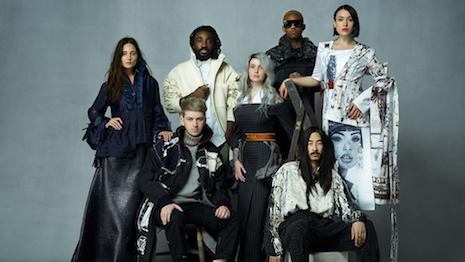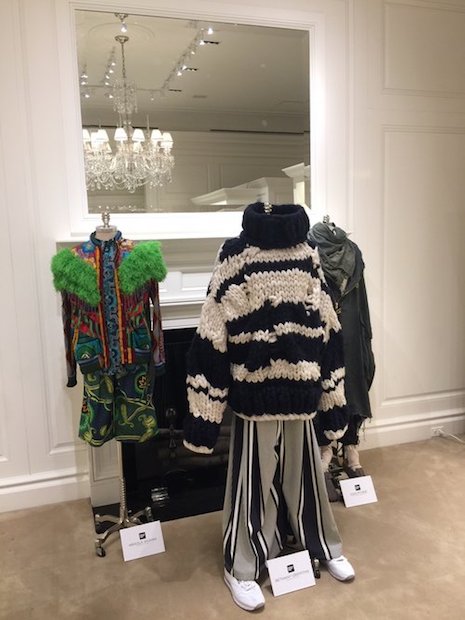 Graduate Fashion Week is bringing commercial companies and students closer together. Image credit: Graduate Fashion Week
Graduate Fashion Week is bringing commercial companies and students closer together. Image credit: Graduate Fashion Week NEW YORK – It is in fashion brands’ best interests to take an active role in supporting future talent.
The nonprofit Graduate Fashion Week and its supporters have seen firsthand the benefit of bringing students and companies together, forging relationships that can lead to careers. For the first time, the London-based organization crossed the pond for a U.S. showcase in partnership with SmartFocus, building on its existing global presence.
"It’s really important for Graduate Fashion Week to have a presence in the U.S.," said Martyn Roberts, managing director of Graduate Fashion Week.
"We already work with a number of American universities—Parsons, FIT, SCAD, Pratt, Rhode Island," he said. "And what we’ve discovered is that graduates all around the world have the same issues: the transfer from education into employment. But also for the brands to understand what they can get the most out of the students and the students understand what brands want and the universities so they can educate them for the future.
"So we wanted to come to America because there’s so many big brands that are here that are renowned around the world. And you’re our neighbors across the pond and it’s a very logical place for us to be and to build relationships and also to understand what the American industry wants so that when graduates from wherever they are in the world come through, they’re actually ready for [the American] industry."
Career launchpad
Founded in 1991, Graduate Fashion Week is a charity focused on providing support to students looking to enter the fashion industry, whether they seek design, marketing, business or photography roles.
Each year, the charity showcases the work of more than 1,000 students and graduates through runway shows and exhibitions. This four-day event draws about 30,000 attendees.
With SmartFocus’ help, Graduate Fashion Week has also gone digital, allowing it to reach a more global audience and extend the conversation.
Over the years, GFW has acted as a springboard for talents including Stella McCartney, Giles Deacon, Matthew Williamson and Christopher Bailey, who was the first recipient of the Graduate Fashion Week Gold Award.
Along with Dame Vivienne Westwood, Victoria Beckham and Nick Knight, Mr. Bailey serves as a lifetime patron of the organization.
While in New York, GFW presented the work of select students at a breakfast at Ralph Lauren’s headquarters on Jan. 16. The event featured designs from former Kingston University student Kate Clark, who is now at Chanel, and Daniel Rynne, who graduated from Arts University Bournemouth and who is now working at department store Debenhams.
Graduate Fashion Week's New York showcase included participants from its 2017 event. Image credit: Graduate Fashion Week
Representative of its global showcase, GFW also spotlighted designs from Parsons graduate Emelie Cleveland, Pratt Institute’s Lyudmila Sullivan and Fashion Institute of Technology graduates Margarita Ng Ng and Cristina Ng Ng. All of these graduates were finalists in the International Catwalk Competition during last year’s event.
Included in this global competition are students from 36 colleges in Russia, Germany, China and more.
During the GFW presentation, footwear label Clarks’ chief brand officer Jason Beckley said that the organization’s work is not only beneficial to fashion students but also to companies. By providing a platform to these graduates, brands also gain access to talent.
Mr. Beckley argued for a change in how companies partner with education, potentially replacing the internship with relationship building.
The fashion industry employs 2 million individuals in the United States alone, but creating a path between graduation and career can be a challenge for both brands and students.
For brands, partnering with Graduate Fashion Week gives them the ability to engage with and nurture talent through sponsorships. Among the brand partners of the organization are Swarovski and dunhill.
"We are a charity but we’re not just about take money and run," Mr. Roberts said. "It’s actually about working with the brands to ensure they get the maximum amount of it, the graduates get the maximum amount of it as well. It’s a win-win situation."
Talent search
Luxury is currently facing an onslaught of challenges, but one factor that may prove most damaging to the business’ future is dwindling interest in artisanal skills as professional career paths.
While talks of emerging markets, changing consumer behavior and retail’s shifting formats tend to dominate luxury marketers’ conversations, the decline in dedicated and skilled talent could prove disastrous for brands that rely heavily on handmade goods. Educational initiatives have become essential to introduce students to a range of craftsmanship and to portray the luxury goods and service world as a viable career option on both the creative and professional sides of the business (see story).
Increasingly, luxury brands are offering students coursework designed to prepare them for careers in the industry.
French fashion brand Yves Saint Laurent is nurturing the next generation of fashion talent with educational programs in partnership with two major French fashion schools.
Partnering with the Institut Français de la Mode (IFM) and the École de la Chambre Syndicale de la Couture Parisienne (ECS), Saint Laurent is offering prospective designers a program that combines an internship at the company with courses at the schools to nurture innovation and sustainability (see story).
"As we all know, the retail and fashion industry is changing very rapidly," Mr. Roberts said. "For a long time, film changed, music changed. Once upon a time, bands sold LPs. Now that’s just a minor thing that they do. The whole industry had to change.
"Fashion’s going through this at the moment, which means you need new and exciting talent to come through," he said. "And it can be fashion design, but it also can be marketing, people working in social media or understanding digital retail, through to people who are going to visualize it and pull it all together, having industry and education having a conversation so that they can produce what is needed for the next generation."
